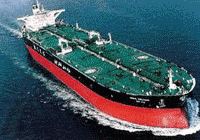
Iran 'squeezed by Asia oil import cutbacks'
Singapore, April 24, 2012
Virtually every day there is news on how Iran's oil exports to Asia are being squeezed by Western sanctions, but the question that still remains unresolved is just how much pain is Tehran feeling.
The latest sign that Iran may be starting to feel the pinch is that half of the Islamic Republic's tanker fleet is being used for floating storage, presumably because buyers for cargoes can't be found, says Clyde Russell, a Reuters market analyst in an article.
As much as 33 million barrels of oil are being held on tankers and shore-based storage at Iran's main Kharg Island terminal is also said to be full at 23 million barrels.
Add to this reports of declining purchases by major buyers China, Japan, South Korea and India, the threat of a total European ban on imports from July and the difficulty of insuring cargoes even for countries still willing to buy and you would think Iran's rulers might start getting concerned.
The National Iranian Oil Company, like most state-controlled producers, isn't exactly forthcoming in what it says publicly, but what it has acknowledged is that its exports have dropped to 2.1 million barrels a day, down from 2.3 million in the year ended March 19.
A decline of only 200,000 barrels a day sounds too small, based upon what buyers of Iranian crude are stating. Based on latest figures, it would appear that China, South Korea and Japan, the major Asian buyers of Iranian crude, have cut imports by a combined 600,000 barrels a day.
This includes a 54 percent cut by China in March to 253,000 barrels a day, an almost 40 percent drop in March by South Korea to 154,000 barrels a day and reports that Japan is cutting its April imports to 75,000 barrels a day, a cut of as much as 77 percent from the first two months of 2012.
Add to this smaller reductions by India and other nations, such as South Africa, and it would appear that Iran should be able to sell not much more than 1.5 million barrels a day from this month onwards, and potentially much less if Europe does push ahead with its ban.
Of course, the above numbers assume everybody is being 100 percent honest, and that Iranian crude isn't being transshipped, blended in offshore storage or any other myriad of ways to circumvent Western sanctions.
Certainly, if you talk to oil traders, everybody denies they are doing anything dodgy, as you would expect, but some will acknowledge that it's possible to get around sanctions if you are determined enough.
But even if Iran is still managing to shift its oil, the costs of doing so must be rising, and the revenue is also likely to be falling as Tehran is forced to offer bigger discounts.
If it's accurate that Iran is losing about 600,000 barrels a day in exports to Asia, that amounts to $660 million a day in lost revenue, assuming a price of $110 a barrel. This equates to more than $24 billion a year, and this doesn't include the impact if Europe does go ahead and ban the import of the 700,000 barrels a day of Iranian oil it had been purchasing.
Some of this lost revenue will have been offset by higher crude prices, with Brent having gained 10.2 percent so far this year, although the current price of around $118 a barrel is down from the peak this year above $126 in early March.
If you further assume that the dispute over Iran's nuclear program had never happened, then a reasonable scenario would be Iranian exports of about 2.3 million barrels a day and an oil price of about $100. This yields annual revenue around $84 billion, so if Iranian export losses are 600,000 barrels a day at a cost $24 billion a year, it means Tehran is foregoing more than a quarter of its potential oil revenue.
Is this enough to hurt the government badly enough for it to seek ways of compromising on its nuclear activities, which Iran claims is entirely for civilian power generation, while Western nations fear it is aimed at developing weapons. The answer to that question may come at the next round of talks between Iran and world powers, scheduled to be held next month in Baghdad. -Reuters. (Clyde Russell is a Reuters market analyst. The views expressed are his own.)







